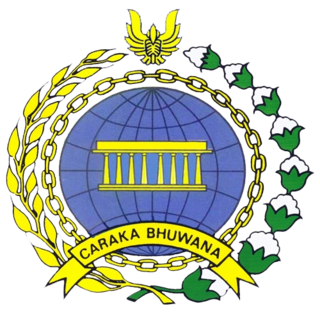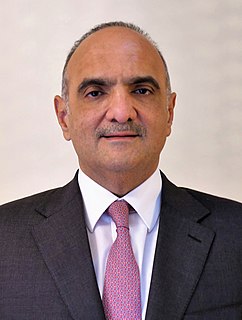
A diplomat is a person appointed by a state or an intergovernmental institution such as the United Nations or the European Union to conduct diplomacy with one or more other states or international organizations.

International relations (IR), international affairs (IA) or international studies (IS) is the scientific study of the international connections between the world's sovereign states. While often cited as one of the main disciplines of modern political science, the study of international relations also draws heavily upon international economics, law, and modern world history, leading many academic institutions to characterise it as an independent academic discipline.

The Camp David Accords were a pair of political agreements signed by Egyptian President Anwar Sadat and Israeli Prime Minister Menachem Begin on 17 September 1978, following twelve days of secret negotiations at Camp David, the country retreat of the President of the United States in Maryland. The two framework agreements were signed at the White House and were witnessed by President Jimmy Carter. The second of these frameworks led directly to the 1979 Egypt–Israel peace treaty. Due to the agreement, Sadat and Begin received the shared 1978 Nobel Peace Prize. The first framework, which dealt with the Palestinian territories, was written without participation of the Palestinians and was condemned by the United Nations.

Extensible Messaging and Presence Protocol is an open communication protocol designed for instant messaging (IM), presence information, and contact list maintenance. Based on XML, it enables the near-real-time exchange of structured data between any two or more network entities. Designed to be extensible, the protocol offers a multitude of applications beyond traditional IM in the broader realm of message-oriented middleware, including signalling for VoIP, video, file transfer, gaming and other uses.
In international relations, public diplomacy or people's diplomacy, broadly speaking, is any of the various government-sponsored efforts aimed at communicating directly with foreign publics to establish a dialogue designed to inform and influence with the aim that this foreign public supports or tolerates a government's strategic objectives. As the international order has changed over the 20th century, so has the practice of public diplomacy. Its practitioners use a variety of instruments and methods ranging from personal contact and media interviews to the Internet and educational exchanges.

JTC Corporation, formerly the Jurong Town Corporation, is a government agency in Singapore that champions sustainable industrial development. It masterplans clean, green and smart estates to create attractive destinations for Singapore's talent and communities. The agency also drives innovations in the building and infrastructure sector.

Sister Cities International (SCI) is a nonprofit citizen diplomacy network that creates and strengthens partnerships between communities in the United States and those in other countries, particularly through the establishment of "sister cities". A total of 1,800 cities, states, and counties are partnered in 138 countries around the world. The organization "strives to build global cooperation at the municipal level, promote cultural understanding and stimulate economic development".
Track II diplomacy or "backchannel diplomacy" is the practice of "non-governmental, informal and unofficial contacts and activities between private citizens or groups of individuals, sometimes called 'non-state actors'". It contrasts with track I diplomacy, which is official, governmental diplomacy that occur inside official government channels. However, track two diplomacy is not a substitute replacement for track one diplomacy. Rather, it is there to assist official actors to manage and resolve conflicts by exploring possible solutions derived from the public view and without the requirements of formal negotiation or bargaining for advantage. In addition, the term track 1.5 diplomacy is used by some analysts to define a situation where official and non-official actors cooperate in conflict resolution.

The Bureau of Near Eastern Affairs (NEA), also known as the Bureau of Near East Asian Affairs, is an agency of the Department of State within the United States government that deals with U.S. foreign policy and diplomatic relations with the nations of the Near East. It is headed by the Assistant Secretary of State for Near Eastern Affairs, who reports to the Under Secretary of State for Political Affairs.

Michael Dougall Bell was a Canadian Foreign Service Officer with 36 years experience in the Department of Foreign Affairs, mostly focused on the Middle East. He was Canada's Ambassador to Jordan (1987–90), Egypt (1994–98), and Israel. He was also Chair of the Donor Committee of the International Reconstruction Fund Facility for Iraq.

Israel–Jordan relations are the diplomatic, economic and cultural relations between Israel and Jordan. The two countries share a land border, with three border crossings: Yitzhak Rabin/Wadi Araba Crossing, Jordan River Crossing and the Allenby/King Hussein Bridge Crossing, that connects the West Bank with Jordan. The relationship between the two countries is regulated by the Israel–Jordan peace treaty in 1994, which formally ended the state of war that had existed between the two countries since the establishment of the State of Israel in 1948, and also established diplomatic relations, besides other matters. Relations between the countries get strained from time to time, usually over tensions at the Al-Aqsa mosque. On 8 October 2020, Israel and Jordan reached an agreement to allow flights to cross over both countries’ airspace.
The term Facebook diplomacy was coined sometime in October 2008 in casual notes exchanged on Twitter, in connection to U.S. President Barack Obama's electoral political campaign's keen use of Facebook and other social network websites. The term Facebook diplomacy was further introduced and elaborated to describe the potential 'soft power' that can be created with Internet social networking tools like Facebook to counter terrorism, and interfere with repressive governments and militant groups in a discussion at a social networking and technology conference in December 2008 in New York.
During the December conference in New York, the United States Undersecretary of Public Diplomacy, James Glassman said, "New technology gives the United States and other free nations a significant advantage over terrorists." In his presentation at New York's Columbia University Law School, he went on to illustrate how Facebook diplomacy and on-line activism created success through the use of Facebook groups and the use of the platform to create activism and cause global awareness relative to issues in Colombia against the infamous FARC rebels.

The Ministry of Foreign Affairs of the Republic of Indonesia (MoFA), commonly referred to as the Foreign Affairs Ministry, is a government ministry responsible for the country's foreign politics and diplomacy. The ministry was formerly known as the Department of Foreign Affairs. The name changed due to the new law about State Ministry of 2008.

Diplomacy is the practice of influencing the decisions and conduct of foreign governments or organizations through dialogue, negotiation, and other nonviolent means. Diplomacy usually refers to international relations carried out through the intercession of professional diplomats with regard to a variety of issues and topics.

CleanTech Park is an eco-business park in Singapore, the first in the nation. R&D and test-bedding site for early adoption of green technology and solutions. Under development in three phases with a proposed completion year of 2030, the Park's first multi-tenanted building, CleanTech One, was opened in October 2010. The 50 hectares site is located adjacent to Nanyang Technological University, which plans an integration between the sites as part of its own expansion. In addition to focusing on hosting environmentally friendly industry, the complex is being developed by JTC Corporation with an eye towards environmentally responsible practices, with "green" buildings and maintenance of natural terrain. Together with other precincts such as Nanyang Technological University, Bulim, Tengah, Bahar and CleanTech Park & LaunchPad @ JID forms the future 600-hectare Jurong Innovation District.

In international politics, defence diplomacy refers to the pursuit of foreign policy objectives through the peaceful employment of defence resources and capabilities.
Science diplomacy is the use of scientific collaborations among nations to address common problems and to build constructive international partnerships. Science diplomacy is a form of new diplomacy and has become an umbrella term to describe a number of formal or informal technical, research-based, academic or engineering exchanges, within the general field of international relations.

Eva Abu Halaweh is a lawyer and human rights activist in Jordan, and was awarded the International Women of Courage Award in 2011.
The Syrian Crisis of 1957 was a period of severe diplomatic confrontations during the Cold War that involved Syria and the Soviet Union on one hand, and the United States and its allies, including Turkey and the Baghdad Pact, on the other.

Bisher Al Khasawneh is a Jordanian politician and diplomat who has served as Prime Minister of Jordan and Minister of Defense since 12 October 2020.













